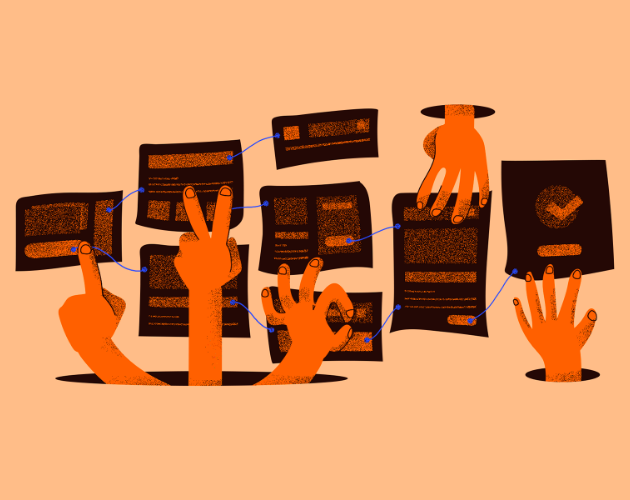When you decide to take a software service, you should be ready to go into a process. Even if you buy a package program, you will need to get support from a team in stages such as installation, testing and broadcasting. As such, you should record both the product you receive and the service you will receive, the terms and stages of this software service. In this article, we have compiled the topics you should not exclude from a software service contract.
Buying a software product or service for your business is a little different than buying a refrigerator. When you buy a fridge, someone comes in, puts the fridge in its place, gets it signed a few documents and goes. The software service can be compared to this; The refrigerator will be produced specifically for your business or it will be made suitable for you by making changes on the existing design, your supplies will be placed in the closet in the order you want, and the cabinet will be measured at certain intervals for stable operation.
While all these things are being done, the software team will go back and forth to your office, clean the cabinet, place it, test it and make some changes. A contract that will record both your relations with the software team during this process and the terms of the product you will receive at the end of the process will protect the rights of both parties.
Any subject agreed on by the parties can be added to the contracts. There is no limit on additions. You can open a title for every subject that is important enough to be written in the contract and edit the terms under this heading. When it comes to contracts, the important thing is the articles that should definitely be. In this article, we will focus on the indispensable items of software service contracts.
1. Payment Plan
The software service spans a process. The companies that provide service make a lot of effort and prepare products during this process. In addition to the pricing on the lining service contract, you should also determine your payment order. Advance to be paid at the beginning of the project, how much will be paid at which stage, how will the remaining payment be made after testing and approval… For this type of service, which extends over a wide period, the payment amounts, terms of payment and payment methods must be recorded on the contract.
2. Confidentiality Agreement
Before you start to get service, you must make a confidentiality agreement on the contract between you and the software company. Many software projects have access to companies' customer information and accounting data. It is your responsibility to prevent such information that is valuable to your business from falling into malicious hands. You should prepare a detailed confidentiality protocol between you and the service company, and record the information shared, data sets and the penalty conditions to be applied in case of failure to comply with the policy.
3. Tools and Processes
In order to follow the process process, you must be familiar with the tools and stages of the process to be used in the software process. What are the paid or free tools to be used while producing software? License fees for these vehicles, if any, will be paid by whom. How will it be determined that the stages specified in the contract have been reached? Recording such information not only protects your rights, but also guarantees a clear understanding of the contractual service for both parties.
4. Success Criteria
As an often overlooked issue, success criteria are vital to your project. You should clearly define what you want to buy from the software for your investment. When will the project be considered complete for you?
You should set this not only for the completion of the project, but also for the goals within the business process. Do not forget to set a target for each service while determining the stages of the service in your negotiations with the company from which you will receive software service. Like "when he can do X, the first part is considered to be finished" ...
5. Intellectual Property Rights and Documentation
You must clearly indicate in your contract who will own the intellectual property rights of the software product you purchased. Other software products are also used when creating software products. Ready-made libraries that make writing easier, code baskets that support or help find errors. So almost no software product is written from scratch. Not all codes can be unique. However, you may also want to own the intellectual property of any product written for your business model or a solution specifically for you.
For someone who doesn't know software, it's pointless to look at a bunch of code. You should request documentation that will make it easy to use, update and integrate in the software product you have received. When you request an update, change or integration with other software and hardware in the future, the information that will guide the relevant people to decode the codes will be useful for you.
5. Pricing and Billing
Let's get to the most important issue! Our advice on this matter is to be clear. The software service may be charged in many ways. You can make a payment to the company you receive service from through the project, you can make a payment per man / hour, or you can develop a pricing policy specific to you. The important thing is that this method is clearly written in the contract and both parties agree to it.
In addition, the details of the invoicing should be determined. There are many options such as the same payment. As long as you agree and sign within the framework of mutual agreement.
Generally, an advance is paid to companies providing services under software service contracts. Later, when the business reaches the stages determined by the parties and is tested, interim payments are made. When the job is approved and published, the remaining payment is completed. You must decide among yourself how this process will be billed.
6. Warranty
Warranty issues can be a bit complicated when it comes to software services. The technology that software products are working on is updated, developed and changed every day. It may withdraw support from the software languages it previously supported, and may find some technologies slower. For this reason, software products generally have a one-year warranty.
You can make a one-year maintenance agreement with the company from which you purchased software service. This way, the error codes of the system are monitored regularly and you can be informed in advance about the major update you will need in the future. Nobody wants to come across a program that doesn't work one morning when they come to work.




